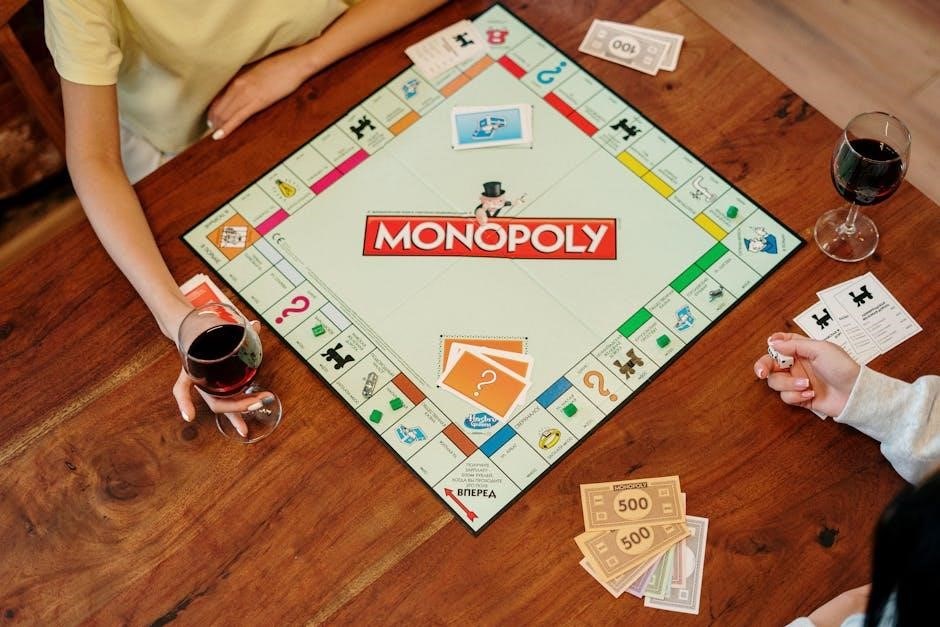monopoly game instructions pdf
Monopoly Game Instructions provide a comprehensive guide to setup, rules, and strategies. Learn the classic rules, equipment needed, and objective to excel in the game. Official rules ensure fair play.
Overview of the Game
Monopoly is a classic board game where players aim to dominate financially by buying, renting, and selling properties. The game involves strategic decisions, dice rolling, and chance cards, making it a mix of luck and strategy. Players collect rent, build houses, and negotiate deals to outperform others and achieve financial dominance.
Importance of Following Official Rules
Official Monopoly rules ensure fair play and prevent disputes. They maintain game balance, preventing prolonged sessions caused by unofficial variations. Adhering to these rules guarantees all players understand the guidelines, fostering a level playing field and preserving the game’s integrity for a competitive yet enjoyable experience.
The Objective of the Game
The objective of Monopoly is to become the wealthiest player by buying, renting, and selling properties, strategically trading, and managing finances to achieve financial dominance.
Becoming the Wealthiest Player
To become the wealthiest player, focus on acquiring high-value properties, strategically trading, and managing finances effectively. Build houses and hotels to maximize rental income. Negotiate deals, collect rent, and drive opponents to bankruptcy. Smart investments and strategic decisions are key to accumulating the most assets and achieving financial dominance in the game.
Key Strategies for Success
Master negotiation tactics to secure advantageous trades and build strategic partnerships. Focus on acquiring properties with high rental potential and manage cash wisely. Utilize the Speed Die for faster gameplay and prioritize building houses and hotels to maximize income. Effective resource management and tactical decision-making are crucial to outperform competitors and achieve long-term success in the game.
Equipment Required
The game includes a board, 2 dice, 28 Title Deed cards, 16 Chance and 16 Community Chest cards, 6 tokens, play money, and 32 houses and hotels.
Components of the Game
The game includes a board, 28 Title Deed cards, 16 Chance and 16 Community Chest cards, 6 tokens, 32 houses, 12 hotels, 2 dice, and play money totaling $20,580. These components are essential for gameplay, with each serving a specific purpose, from property ownership to chance events and financial transactions.
Understanding the Game Board
The Monopoly game board is a vital component, featuring 40 spaces, including 28 properties, 12 chance/community chest spaces, and key areas like “Go,” “Jail,” and “Free Parking.” Properties are color-coded, with the most valuable being dark blue (Boardwalk and Park Place). The board is designed to facilitate gameplay, with spaces arranged to represent real estate, utilities, and chance events, guiding players through the game’s progression and strategic opportunities.
Setting Up the Game
Setting Up the Game involves distributing cash and properties. Each player receives cash and draws three properties. The banker prepares the deck for proper gameplay.
The process includes organizing components and ensuring all players have necessary resources. Proper setup is crucial for a smooth and fair game experience.
Distributing Cash and Properties
Distributing cash and properties is the first step. Each player receives cash equivalent to four Boardwalk properties and draws three random properties without payment. Players can immediately purchase additional properties. This setup ensures a fair start, allowing everyone to begin acquiring assets. The process is straightforward, enabling quick gameplay initiation.
Preparing the Deck of Cards
Prepare the deck by shuffling and dealing cards. Remove the 4 Quick Start Rules cards and distribute them. Shuffle the remaining cards and place them face down. Each player draws two Title Deed cards. This setup ensures a smooth start, allowing players to begin acquiring properties and managing their resources effectively from the outset.

Classic Rules for Playing Monopoly
Classic rules involve buying, renting, and selling properties, rolling dice to move, and following traditional gameplay. Adhering to these ensures a authentic and balanced experience.
Buying, Renting, and Selling Properties
Players buy properties when they land on them, paying the listed price. If uninterested, the property is auctioned. Rent is collected from others landing on your properties. Selling or trading properties strategically can strengthen your position. Official rules govern these transactions, ensuring fair play and maximizing profit opportunities throughout the game.
Rolling the Dice and Moving
Players roll two dice to determine movement. The highest number goes first, and each roll moves the token clockwise. Rolling doubles allows another turn. If doubles are rolled three times, the player goes to jail. Movement is essential for acquiring properties and navigating the board strategically. Official rules ensure consistent play.

Quick Start Rules for a Faster Game
Use the Speed Die to accelerate gameplay. Players move faster and complete the game quicker. These rules streamline traditional play while maintaining core Monopoly strategies.
Using the Speed Die
The Speed Die accelerates gameplay by allowing players to move faster and complete the game more quickly. It introduces new movement options, such as moving forward or skipping spaces, while maintaining the core game mechanics. This optional feature is ideal for experienced players seeking a streamlined experience without sacrificing strategic depth.
- Rolling the Speed Die alongside the traditional dice.
- Players can move forward based on the Speed Die’s instructions.
- Reduces overall game duration while preserving key strategies.
This feature is perfect for those looking to expedite play while enjoying the classic Monopoly experience.
Alternative Ways to Accelerate Play
Besides the Speed Die, players can use Quick Start rules to expedite the game. Deal two Title Deed cards to each player at the start, allowing immediate property ownership. Limit negotiations and auctions to maintain a faster pace. These methods streamline gameplay while retaining the core Monopoly experience, ensuring quicker finishes without sacrificing strategic elements.
- Deal Title Deed cards upfront for instant ownership.
- Set time limits for turns and negotiations.
- Simplify trading by focusing on essential deals.
These alternatives ensure a swift yet enjoyable game.
Property Trading in Monopoly
Property trading is central to Monopoly, enabling players to buy, sell, or exchange properties and cash to strengthen their positions and maximize profit strategically.
Negotiating Deals
Negotiating deals in Monopoly involves strategic bargaining between players to buy, sell, or trade properties and cash. Effective negotiation can lead to mutually beneficial agreements, strengthening one’s position in the game. Players must balance offering fair deals with securing advantageous terms to maximize profit and weaken competitors. Communication and persuasion are key to successful negotiations.
Strategic Trading Tips
Strategic trading in Monopoly involves targeting high-rent properties, completing sets, and improving cash flow. Trade effectively by offering incentives like cash or other properties to secure better deals. Focus on acquiring properties that complement your existing assets to maximize rental income. Timing is crucial; trade when it strengthens your position without compromising your financial stability. Always evaluate trades carefully to ensure mutual benefit or a strategic advantage.
Building Houses and Hotels
Building houses and hotels in Monopoly increases rental income. Construct strategically to maximize profits. Proper placement enhances property values and strengthens your financial position effectively in the game.
Rules for Construction
Building houses and hotels requires sufficient cash and ownership of all properties in a color group. Houses must be placed evenly across properties. You can only build hotels after having four houses on each property in the group. Construction enhances rental income but depletes cash reserves, so plan strategically to maximize profits while managing resources effectively.
Maximizing Rental Income
Maximize rental income by strategically building houses and hotels on high-value properties. Focus on acquiring entire color groups to charge higher rents. Upgrade properties evenly to maintain player interest and income consistency. Prioritize building on frequently landed spaces, like orange and light blue groups, to increase revenue opportunities and accelerate opponents’ financial decline effectively.
Chance and Community Chest Cards
Chance and Community Chest cards add unpredictability, offering rewards, penalties, or actions. Players draw them when landing on respective spaces, impacting finances or movement and enhancing gameplay dynamics.
Understanding Card Effects
Chance and Community Chest cards introduce random events, such as moving spaces, collecting money, or paying fines. These cards can significantly impact a player’s finances or position, adding unpredictability to the game. Understanding their effects is crucial for strategic planning and adapting to sudden changes in gameplay dynamics, ensuring all players stay engaged and responsive during their turns.
Strategic Use of Cards
Chance and Community Chest cards can be strategically leveraged to improve your position or disrupt opponents. Adapting to card effects, such as moving spaces or collecting funds, is key. These cards can enhance financial stability or force strategic decisions, allowing players to outmaneuver others. Using them wisely can turn the game in your favor, maintaining flexibility and maximizing opportunities.
Ending the Game
The game concludes when one player achieves financial dominance or all others face bankruptcy. Final assets are tallied, and the wealthiest player is declared the winner.
Bankruptcy and Elimination
Bankruptcy occurs when a player cannot pay owed debts or expenses. They must mortgage properties or sell assets to the bank. If unable to recover, they are eliminated. Remaining players continue, and the last one standing wins. Liquidation of assets may occur, with others potentially purchasing them, ensuring the game progresses toward a single victor.
Counting Assets and Declaring a Winner
To determine the winner, players calculate their total assets, including cash, property values, and improvements like houses and hotels. The player with the highest total worth is declared the winner. If all other players have gone bankrupt, the remaining player automatically wins. This final assessment ensures a clear conclusion to the game.

Winning Conditions
Victory is achieved by achieving financial dominance, driving all others to bankruptcy, or acquiring the most valuable assets, ensuring one player emerges supreme in the game.
Financial Dominance
Financial dominance is achieved by accumulating the most wealth, driving others to bankruptcy, and strategically managing assets. Key strategies include acquiring high-value properties, maximizing rental income, and making smart trades. Players must balance spending and earning to maintain financial control. The goal is to outlast competitors and emerge as the wealthiest player. Strategic decisions are crucial for long-term success.
Negotiated Victories
Negotiated victories allow players to end the game through mutual agreement, avoiding lengthy gameplay. This occurs when players reach a deal, such as dividing assets or agreeing on a winner. Negotiations often involve strategic compromises, ensuring all parties are satisfied. This method is useful for time-sensitive games or when a clear winner isn’t emerging. Open communication is key to a fair resolution.

Advanced Strategies and Tips
Master negotiation tactics and long-term investment planning to dominate the game. Prioritize acquiring high-rent properties and strategically build houses and hotels to maximize income and control the board.
Mastering Negotiation Tactics
Negotiation is key to Monopoly success. Trade strategically, offering deals that benefit both parties while strengthening your position. Focus on acquiring complete property sets and be willing to bargain for mutually beneficial trades. Timing is crucial; propose deals when they enhance your advantage. Effective negotiation can accelerate your path to financial dominance and victory.
Long-Term Investment Planning
Long-term success in Monopoly requires strategic property purchases and smart cash flow management. Prioritize acquiring complete property sets to maximize rental income. Timing investments in houses and hotels is crucial for optimizing returns. Balance immediate gains with future opportunities, ensuring sustainable growth. Effective long-term planning helps build a strong portfolio, positioning you for victory.
Modern Variations of the Game
Modern Monopoly features themed editions, such as movies, sports, and cities, offering unique twists. Digital versions and updates enhance gameplay with new rules and faster play options.
Themed Editions
Themed editions of Monopoly refresh the classic game with unique twists, such as movie franchises, sports teams, or city-specific designs. These editions maintain the core gameplay while offering fans a chance to engage with their favorite themes. Players can enjoy updated property names, tokens, and artwork, making each edition a fresh experience while staying true to the original objective of becoming the wealthiest player.
Digital Versions and Updates
Digital versions of Monopoly offer modern convenience, allowing players to enjoy the game on PCs, consoles, and mobile devices. These versions often feature updated graphics, online multiplayer modes, and new rule variations. Regular updates enhance gameplay and expand content, ensuring the classic board game stays relevant in the digital age while maintaining its timeless appeal and strategy.
